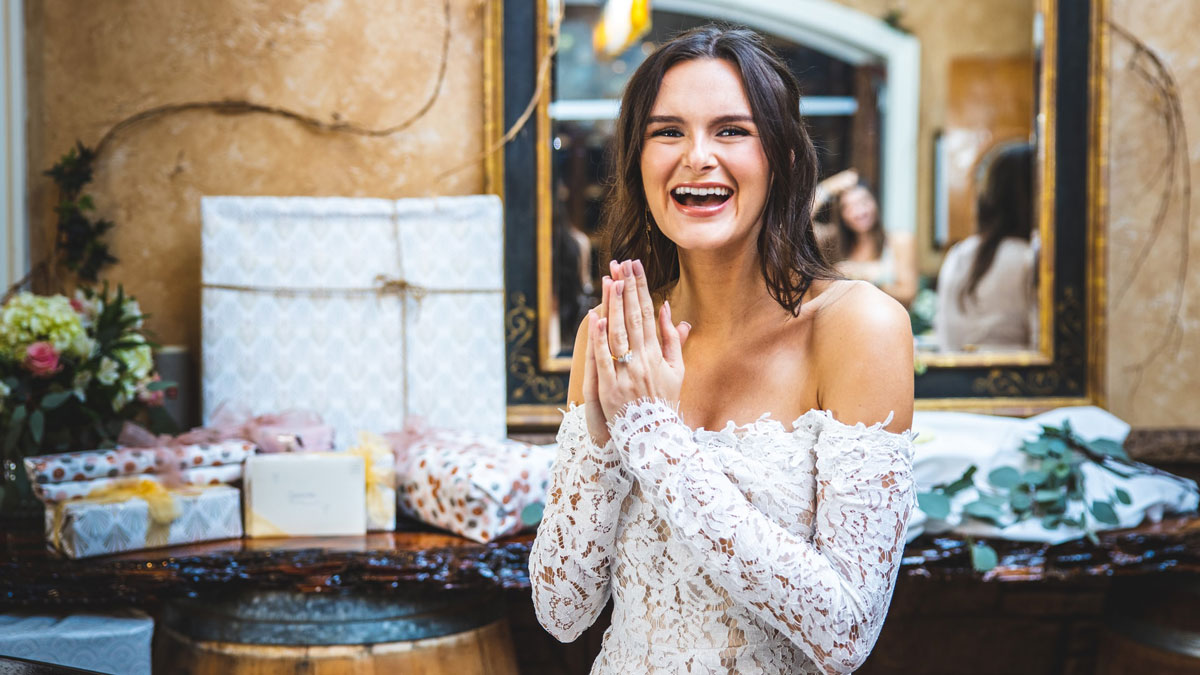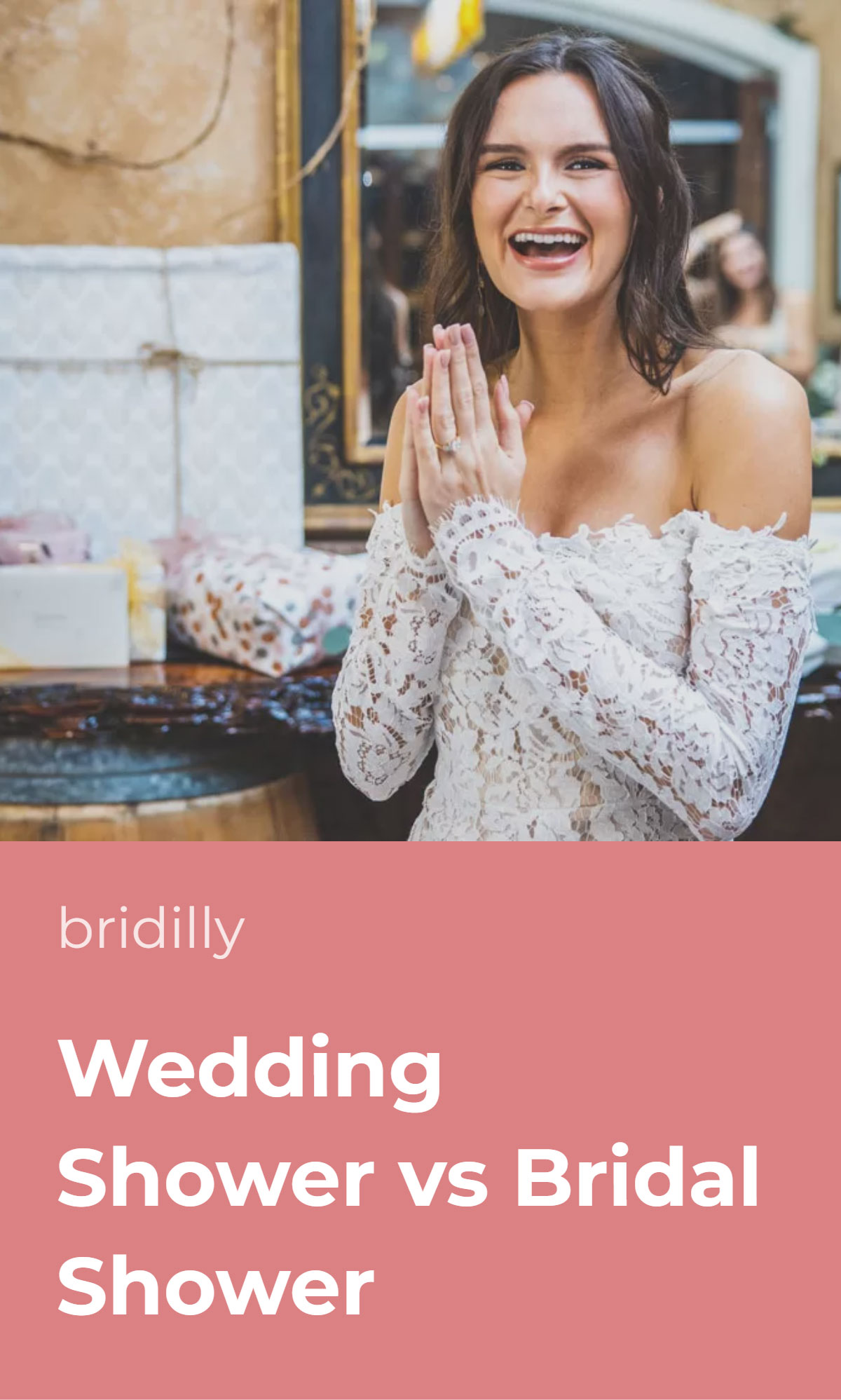The difference between a wedding shower vs. bridal shower is unclear for many couples and wedding party members.
That doesn’t come as a surprise with many events sprinkled along the wedding timeline, including the engagement party, bachelorette and bachelor parties, and the bridal or wedding shower.
Some people mistakenly use the terms interchangeably. Although bridal and wedding showers have a lot in common, they are two distinctly different events.
Both events revolve around gifts, but the event history, hosts, guest list, activities, and other factors differ.
The term bridal shower gives a hint on its relation to the bride. On the other hand, a wedding shower is also known as a couples shower, indicating its neutrality.
Table of Contents [show]
What’s the Purpose of The Event?
The critical difference between a wedding shower and a bridal shower is the event’s meaning and purpose. A bridal shower is a more traditional event – the custom dates back to the 16th century in Europe.
Initially, bridal showers were an alternative to the dowry system. If the bride was poor or her parents were against the marriage and refused a dowry, her friends and extended family hosted a bridal shower.
The purpose of the event was to bring the bride gifts to serve as a dowry. American ladies adopted the tradition in the Victorian Era. However, ladies of higher echelons in the U.S. didn’t need a dowry.
Instead, they used bridal showers to gossip and exchange advice about married life, but gifts were still a vital part of the celebration. The gifts have become more modest over the centuries and typically include home goods.
The bridal shower meaning didn’t change much throughout the years. This event celebrates the bride’s new role. Her close ones gather to prepare her for her soon married life, exchange helpful advice, and give gifts.
On the other hand, a wedding shower is a relatively modern invention. The meaning behind the event is the same as that of a bridal shower – preparing the couple for the new married life.
A wedding shower is essentially a modern twist on the bridal shower, celebrating both partners rather than solely the bride. After all, grooms can also be nervous about their new role.
Furthermore, the term bridal shower can be problematic when there is no bride. Wedding showers are more inclusive and therefore preferred by same-sex couples.
Who’s Invited?
Traditionally, bridal showers were women-only events attended by the bride’s female family members and friends. Nowadays, the rules aren’t so strict. Bridal showers also welcome the bride’s male friends and family members.
Most importantly, the guests should be close to the bride, be it her grandfather, uncle, aunt, bridesmaids, brothers, or sisters.
The guest list is limited to people from the bride’s side and excludes the groom’s friends and extended family.
However, the groom’s female immediate family members are welcome, such as his mother and sister. Only inviting people who are invited to the wedding is a critical aspect of bridal shower etiquette.
In contrast, wedding showers welcome anyone close to the couple – their friends, family members, and even colleagues of any gender. Same as with a bridal shower, the guest list is limited to people invited to the wedding.
There’s no need to invite the entire wedding – the guest list is typically relatively small and only includes the couple’s most important people.
A wedding shower is a perfect way to get the bride’s and groom’s family members and friends acquainted before the wedding to eliminate awkwardness.
Who Hosts The Party?
Since bridal showers emerged as female-only events, they were initially hosted by women. Traditionally, the bride’s extended family members or friends handled all the planning and paid for the food and drinks.
The bride’s immediate family members didn’t take part in the planning because it could be seen as asking for money. Nowadays, the event’s focus has shifted from gifts to having fun and sharing advice, so the rule isn’t actual.
The bridal shower host can be anyone close to the bride who doesn’t mind investing the time, including her mother, sister, aunt, cousin, or maid of honor.
Organizing an event alone is tricky, so bridesmaids and family members often plan it together. At the very least, bridesmaids are expected to chip in.
Sometimes, the bride’s male friends or family members also participate in the planning, although it isn’t traditional.
The groom’s mother or sister can plan the shower as a sign of acceptance in the family. However, that’s also a modern take on the tradition.
Furthermore, the groom’s family may not know the bride well enough, so the bridesmaids’ and bride’s family members’ help is still welcome.
As for the wedding shower, the rules are even less definite. It can be planned by anyone from the wedding party, typically the couple’s immediate family members or closest friends.
The bridal or wedding shower is often a surprise. In this case, the couple’s friends and family members should communicate with other wedding party members to ensure they aren’t planning two events.
Communication is also necessary to ensure everyone close to the couple is invited and no one’s left out. Sometimes, the couple takes part in planning and can even chip in.
You may wonder – can you have both a bridal and a wedding shower? Technically, yes, but there are some pitfalls. They shouldn’t be too close on the timeline, and asking the guests to bring gifts to both events may be too much.
Gifts
Gifts are an integral element of any bridal shower. Traditionally, the party guests bring practical gifts helpful in marriage, such as kitchen appliances and other home stuff (no sexism intended).
If the bride has a wedding gift registry, the etiquette states that guests should choose gifts from the registry. Most importantly, the gifts should be appropriate to the even’s tone.
A bridal shower is traditionally a daytime event that involves people of all ages. Often, the bride opens the gifts in front of everyone, and she shouldn’t be embarrassed to do so.
On the other hand, wedding shower gifts must be items the couple can enjoy together, from household items to diving lessons for two. Monetary gifts and gift cards are also common nowadays.
If the couple has a wedding gift registry, choosing items from the list is a good tone, but it isn’t mandatory if the guests have a better idea.
Guest favors are optional in both cases. The couple may get small gifts to express gratitude to the hosts and attendees. However, bridal showers and wedding showers are often planned as a surprise, so favors aren’t mandatory.
Activities
A large part of the bridal shower and wedding shower revolves around eating and drinking, but the activities aren’t limited to that. Bridal shower activities often involve games and ice breakers like trivia or bingo.
The bride may open her gifts in front of everyone. Gift bingo and gift guessing are popular ways to make the process more fun. However, if the bride doesn’t want to open the gifts during the party, she’s free to refrain from it.
If the bride doesn’t like to be in the center of attention for too long, she may ask the guests to bring gifts unwrapped and display them on the table, avoiding the gift opening tradition.
Most importantly, everyone should be able to participate in the fun. Bridal showers are attended by people of all ages, including the elderly and kids, so extreme sports and drinking games aren’t the best ideas.
Wedding shower activities can also include games and gift opening, but there’s no set tradition. Often, wedding showers are relaxed social gatherings with fluid seating, focused on communication rather than fun activities.
Sometimes, bridal showers and wedding showers have a theme. The theme can be any that appeals to the bride in the case of a bridal shower or the couple in the case of a wedding shower.
The theme dictates the location, food, dress code, and activities. For instance, a nautical wedding shower can involve a yacht cruise, or a Hollywood-themed bridal shower can involve a “guess the movie” quiz.
Timeline
Both parties are meant to prepare the couple for their new roles rather than celebrate the engagement. Thus, they are held not long before the big day.
The bridal shower and wedding shower typically take place three months to three weeks before the wedding.
The last three weeks of wedding planning tend to be extremely busy, and the couple typically doesn’t have time to party.
However, communicating with the couple is essential even if you plan a party within the recommended timeframe. Ensure that they don’t have any plans scheduled like cake tasting or wedding dress fitting.
Location & Time
Although bridal showers and wedding showers take place within the same timeframe, the time of day and location may differ.
Bridal showers are traditionally daytime events taking place at brunch, lunch, or afternoon. The party can be held anywhere, from a backyard to an exquisite restaurant or beach. The site should be accessible for all guests.
Wedding shower time and location are a bit more flexible. They often take place during the day, but evening wedding showers are also possible. The site is entirely up to the hosts.
Although the rules aren’t strict, bridal showers are typically held at a host’s home and wedding showers at a venue.
This makes sense because the wedding shower location should be spacious enough to accommodate guests from both sides.













No Comments Add one
Leave a Comment